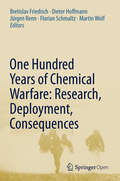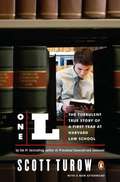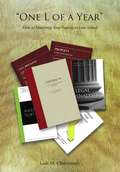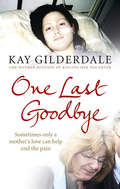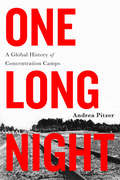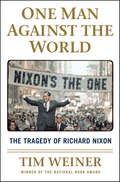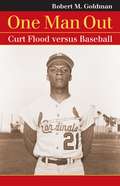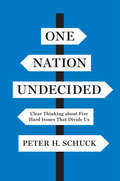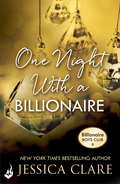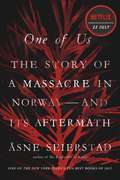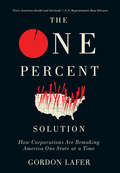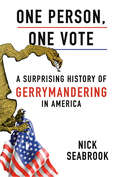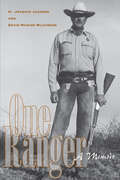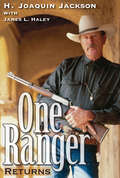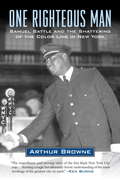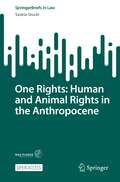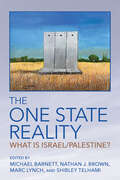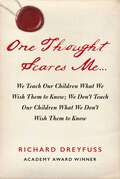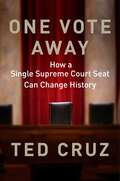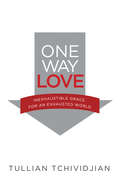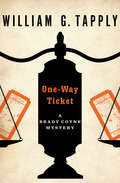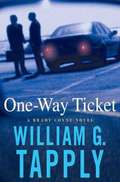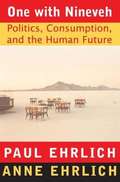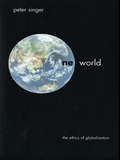- Table View
- List View
One Hundred Years of Chemical Warfare: Research, Deployment, Consequences
by Martin Wolf Florian Schmaltz Jürgen Renn Dieter Hoffmann Bretislav FriedrichThis book is open access under a CC BY-NC 2.5 license. On April 22, 1915, the German military released 150 tons of chlorine gas at Ypres, Belgium. Carried by a long-awaited wind, the chlorine cloud passed within a few minutes through the British and French trenches, leaving behind at least 1,000 dead and 4,000 injured. This chemical attack, which amounted to the first use of a weapon of mass destruction, marks a turning point in world history. The preparation as well as the execution of the gas attack was orchestrated by Fritz Haber, the director of the Kaiser Wilhelm Institute for Physical Chemistry and Electrochemistry in Berlin-Dahlem. During World War I, Haber transformed his research institute into a center for the development of chemical weapons (and of the means of protection against them).Bretislav Friedrich and Martin Wolf (Fritz Haber Institute of the Max Planck Society, the successor institution of Haber’s institute) together with Dieter Hoffmann, Jürgen Renn, and Florian Schmaltz (Max Planck Institute for the History of Science) organized an international symposium to commemorate the centenary of the infamous chemical attack. The symposium examined crucial facets of chemical warfare from the first research on and deployment of chemical weapons in WWI to the development and use of chemical warfare during the century hence. The focus was on scientific, ethical, legal, and political issues of chemical weapons research and deployment — including the issue of dual use — as well as the ongoing effort to control the possession of chemical weapons and to ultimately achieve their elimination.The volume consists of papers presented at the symposium and supplemented by additional articles that together cover key aspects of chemical warfare from 22 April 1915 until the summer of 2015.
One L: The Turbulent True Story Of A First Year At Harvard Law School
by Scott TurowFor those who have not been to law school, Turow makes the experience breathe; for those who have, he recalls it vividly. His book is an important document, albeit a personal one, because it raises disturbing questions about the means and ends of legal education.
''One L Of A Year'': How To Maximize Your Success In Law School
by Leah M. ChristensenMany books give law students advice about how to navigate through their first year of law school. This book strives to be something different. The purpose of "One L of a Year" is to focus on the reading, studying and testing strategies used by the most successful law students. This book is more than advice—it is a learning guide based upon empirical research and statistical correlations between law student learning and their law school GPAs.Most importantly, this book attempts to show you what high-ranking law students have done to achieve success during their first year. It's one thing to read about how to take a law school essay exam—it's quite another thing to see examples of student essays, outlines, legal memoranda, and multiple choice questions. With drive and determination, most students can get through law school. However, "One L of a Year" gives you the research-based skills to maximize your own success.
One Last Goodbye: Sometimes only a mother's love can help end the pain
by Kay GilderdaleWatching her child die is the hardest thing a mother can ever do. But for Kay Gilderdale, saying a final goodbye to her only daughter Lynn was exceptionally painful: she'd played a part in her death.Lynn was just 14 when she was struck down by the crippling disease ME, leaving her paralysed and in constant agony. Over the next 17 years, she became desperate to escape her miserable existence, even begging her mum to help her die. So, one night, when Kay found Lynn attempting suicide, she was forced to make an impossible decision. Continue watching her child suffer or help her end the pain?Eventually, fighting her every instinct, Kay helped her precious daughter take a fatal overdose. But while Lynn was finally free, her mother faced a fresh agony - a possible lifetime behind bars. The highly controversial trial that followed opened a fierce public debate on assisted suicide. Is it murder or mercy?Here, in her heartbreaking story, Kay reveals the harrowing truth behind the headlines and the desperate lengths a mother will go to for the love of a child.
One Long Night: A Global History of Concentration Camps
by Andrea PitzerA groundbreaking, haunting, and profoundly moving history of modernity's greatest tragedy: concentration campsFor over 100 years, at least one concentration camp has existed somewhere on Earth. First used as battlefield strategy, camps have evolved with each passing decade, in the scope of their effects and the savage practicality with which governments have employed them. Even in the twenty-first century, as we continue to reckon with the magnitude and horror of the Holocaust, history tells us we have broken our own solemn promise of "never again."In this harrowing work based on archival records and interviews during travel to four continents, Andrea Pitzer reveals for the first time the chronological and geopolitical history of concentration camps. Beginning with 1890s Cuba, she pinpoints concentration camps around the world and across decades. From the Philippines and Southern Africa in the early twentieth century to the Soviet Gulag and detention camps in China and North Korea during the Cold War, camp systems have been used as tools for civilian relocation and political repression. Often justified as a measure to protect a nation, or even the interned groups themselves, camps have instead served as brutal and dehumanizing sites that have claimed the lives of millions.Drawing from exclusive testimony, landmark historical scholarship, and stunning research, Andrea Pitzer unearths the roots of this appalling phenomenon, exploring and exposing the staggering toll of the camps: our greatest atrocities, the extraordinary survivors, and even the intimate, quiet moments that have also been part of camp life during the past century.
One Man Against the World: The Tragedy of Richard Nixon
by Tim WeinerThe National Book Award–winning author of Legacy of Ashes delivers “a devastating account of Nixon’s presidency . . . powerful [and] extraordinary” (Publishers Weekly, starred review).Drawing on newly declassified documents, One Man Against the World paints a devastating portrait of a tortured yet brilliant man who led the country largely according to a deep-seated insecurity and distrust of not only his cabinet and congress, but the American population at large. In riveting prose, Tim Weiner illuminates how the Vietnam War and the Watergate controversy that brought about Nixon’s demise were inextricably linked.From the hail of garbage and curses that awaited Nixon upon his arrival at the White House, to the unprecedented action Nixon took against American citizens, to the infamous break-in and the tapes that bear remarkable record of the most intimate and damning conversations between the president and his confidantes, Weiner narrates the history of Nixon’s anguished presidency in fascinating and fresh detail.A crucial new look at the greatest political suicide in history, One Man Against the World leaves us not only with new insight into this tumultuous period, but also into the motivations and demons of an American president who saw enemies everywhere, and, thinking the world was against him, undermined the foundations of the country he had hoped to lead.
One Man Out: Curt Flood vs Baseball
by Robert M. GoldmanWhen Curt Flood, all-star center fielder for the St. Louis Cardinals, refused to be traded to the Philadelphia Phillies in 1968, he sent shock waves throughout professional baseball that ultimately reached the Supreme Court.
One Nation Undecided: Clear Thinking about Five Hard Issues That Divide Us
by Peter H. SchuckLet's be honest, we've all expressed opinions about difficult hot-button issues without always thinking them through. With so much media spin, political polarization, and mistrust of institutions, it's hard to know how to think about these tough challenges, much less what to do about them. One Nation Undecided takes on some of today's thorniest issues and walks you through each one step-by-step, explaining what makes it so difficult to grapple with and enabling you to think smartly about it.In this unique what-to-do book, Peter Schuck tackles poverty, immigration, affirmative action, campaign finance, and religious objections to gay marriage and transgender rights. For each issue, he provides essential context; defines key concepts and values; presents the relevant empirical evidence; describes and assesses the programs that now seek to address it; and considers many plausible solutions. Schuck looks at all sides with scrupulous fairness while analyzing them rigorously and factually. Each chapter is self-contained so that readers may pick and choose among the issues that interest and concern them most. His objective is to educate rather than proselytize you—the very nature of these five issues is that they resist clear answers; reasonable people can differ about where they come out on them.No other book provides such a comprehensive, balanced, and accessible analysis of these urgent social controversies. One Nation Undecided gives you the facts and competing values, makes your thinking about them more sophisticated, and encourages you to draw your own conclusions.
One Night With A Billionaire: Billionaire Boys Club 6 (Billionaire Boys Club)
by Jessica ClareFans of J.S. Scott, Louise Bay and Melody Anne - prepare to be dazzled by Jessica Clare's Billionaire Boys Club.The Billionaire Boys Club is a secret society of six incredibly wealthy men who have vowed success in business - at any cost. But success when it comes to love is a different matter...Kylie may be a makeup artist to the stars, but she knows what it feels like to be overshadowed. Especially by her famous boss, the pop star Daphne. That's why she's stunned - and delighted - when one night at a party, she attracts the attention of a gorgeous stranger. But when Daphne decides she wants the handsome billionaire for herself, Cade Archer is suddenly off-limits for Kylie...Cade has known Daphne for years, and always wondered if she might be the right woman for him - even though she never gave him the time of day. But one sizzling night with Kylie has changed everything. So why is she suddenly avoiding him? Fortunately Cade is determined to get what he wants, and he'll do anything to show Kylie she can get everything she wants too...Want more irresistible romance? Look for the rest of Billionaire Boys Club titles, starting with Stranded With A Billionaire, as well as the sizzling spinoff series, Billionaires and Bridesmaids, starting with The Billionaire And The Virgin.
One of Us: The Story of Anders Breivik and the Massacre in Norway
by Åsne Seierstad Sarah DeathOn July 22, 2011, Anders Behring Breivik detonated a bomb outside the Norwegian prime minister's office in central Oslo, killing eight people. He then proceeded to a youth camp on the wooded island of Utøya, where he killed sixty-nine more, most of them teenage members of the country's governing Labour Party. One of Us tells the story of this terrible day and its reverberations. Åsne Seierstad delves deep into Breivik's childhood, tracing the unlikely path that led him to become one of Europe's most reviled terrorists, and writes with equal intimacy about his victims. One of Us is at once a psychological study of violent extremism, a dramatic true crime procedural, and a compassionate inquiry into how a privileged society copes with homegrown evil. This is the true story of one of our age's most tragic events. Named "ONE OF THE BEST BOOKS OF THE YEAR" (2015) by THE NEW YORK TIMES'S BOOK REVIEW, NPR, THE BOSTON GLOBE, THE GUARDIAN, BUZZFEEED, PUBLISHERS WEEKLY, AND MEN'S JOURNAL. This book has also been made into the movie "22 July."
The One Percent Solution: How Corporations Are Remaking America One State at a Time
by Gordon LaferIn the aftermath of the 2010 Citizens United decision, it's become commonplace to note the growing political dominance of a small segment of the economic elite. But what exactly are those members of the elite doing with their newfound influence? The One Percent Solution provides an answer to this question for the first time. Gordon Lafer's book is a comprehensive account of legislation promoted by the nation's biggest corporate lobbies across all fifty state legislatures and encompassing a wide range of labor and economic policies.In an era of growing economic insecurity, it turns out that one of the main reasons life is becoming harder for American workers is a relentless—and concerted—offensive by the country’s best-funded and most powerful political forces: corporate lobbies empowered by the Supreme Court to influence legislative outcomes with an endless supply of cash. These actors have successfully championed hundreds of new laws that lower wages, eliminate paid sick leave, undo the right to sue over job discrimination, and cut essential public services.Lafer shows how corporate strategies have been shaped by twenty-first-century conditions—including globalization, economic decline, and the populism reflected in both the Trump and Sanders campaigns of 2016. Perhaps most important, Lafer shows that the corporate legislative agenda has come to endanger the scope of democracy itself. For anyone who wants to know what to expect from corporate-backed Republican leadership in Washington, D.C., there is no better guide than this record of what the same set of actors has been doing in the state legislatures under its control.
One Person, One Vote: A Surprising History of Gerrymandering in America
by Nick SeabrookA redistricting crisis is now upon us. This surprising, compelling book tells the history of how we got to this moment—from the Founding Fathers to today&’s high-tech manipulation of election districts—and shows us as well how to protect our most sacred, hard-fought principle of one person, one vote. Here is THE book on gerrymandering for citizens, politicians, journalists, activists, and voters.Nick Seabrook, an authority on constitutional and election law and an expert on gerrymandering (pronounced with a hard &‘G&’!), begins before our nation&’s founding, with the rigging of American elections for partisan and political gain and the election meddling of George Burrington, the colonial governor of North Carolina, in retaliation against his critics. The author writes of Patrick Henry, who used redistricting to settle an old score with political foe and fellow Founding Father James Madison (almost preventing the Bill of Rights from happening), and of Elbridge Gerry, the Massachusetts governor from whose name &“gerrymander&” derives. One Person, One Vote explores the rise of the most partisan gerrymanders in American history, put in place by the Republican Party after the 2010 census. We see how the battle has shifted to the states via REDMAP—the GOP&’s successful strategy to control state governments and rig the results of state legislative and congressional elections over the past decade. Seabrook makes clear that a vast new redistricting is already here, and that to safeguard our republic, action is needed before it is too late.
One Ranger: A Memoir (Bridwell Texas History Series)
by H. Joaquin Jackson David Marion WilkinsonA retired Texas Ranger recalls a career that took him from shootouts in South Texas to film sets in Hollywood.When his picture appeared on the cover of Texas Monthly, Joaquin Jackson became the icon of the modern Texas Rangers. Nick Nolte modeled his character in the movie Extreme Prejudice on him. Jackson even had a speaking part of his own in The Good Old Boys with Tommy Lee Jones. But the role that Jackson has always played the best is that of the man who wears the silver badge cut from a Mexican cinco peso coin, a working Texas Ranger. Legend says that one Ranger is all it takes to put down lawlessness and restore the peace: one riot, one Ranger. In this adventure-filled memoir, Joaquin Jackson recalls what it was like to be the Ranger who responded when riots threatened, violence erupted, and criminals needed to be brought to justice across a wide swath of the Texas-Mexico border from 1966 to 1993.Jackson has dramatic stories to tell. Defying all stereotypes, he was the one Ranger who ensured a fair election—and an overwhelming win for La Raza Unida party candidates—in Zavala County in 1972. He followed legendary Ranger Captain Alfred Y. Allee Sr. into a shootout at the Carrizo Springs jail that ended a prison revolt and left him with nightmares. He captured &“The See More Kid,&” an elusive horse thief and burglar who left clean dishes and swept floors in the houses he robbed. He investigated the 1988 shootings in Big Bend&’s Colorado Canyon and tried to understand the motives of the Mexican teenagers who terrorized three river rafters and killed one. He even helped train Afghan mujahedin warriors to fight the Soviet Union.Jackson&’s tenure in the Texas Rangers began when older Rangers still believed that law need not get in the way of maintaining order, and concluded as younger Rangers were turning to computer technology to help solve crimes. Though he insists, &“I am only one Ranger. There was only one story that belonged to me,&” his story is part of the larger story of the Texas Rangers becoming a modern law enforcement agency that serves all the people of the state. It&’s a story that&’s as interesting as any of the legends. And yet, Jackson&’s story confirms the legends, too. With just over a hundred Texas Rangers to cover a state with 267,399 square miles, any one may become the one Ranger who, like Joaquin Jackson in Zavala County in 1972, stops one riot.&“A powerful, moving read . . . One Ranger is as fascinating as the memoirs of nineteenth-century Rangers James Gillett and George Durham, and the histories by Frederick Wilkins and Walter Prescott Webb—and equally as important.&” —True West&“A straight-shooting book that blow[s] a few holes in the Ranger myth while providing more ammunition for the myth&’s continuation. . . . Reads more like a novel than [an] autobiography.&” —Austin American-Statesman
One Ranger Returns (Bridwell Texas History Series)
by H. Joaquin Jackson James L. HaleyA retired Texas lawman shares stories of serial killers, labor strikes, and more, in this sequel to the runaway bestselling memoir One Ranger.No Texas Ranger memoir has captured the public&’s imagination like Joaquin Jackson&’s One Ranger. Readers thrilled to Jackson&’s stories of catching criminals and keeping the peace across a wide swath of the Texas-Mexico border and clamored for more. Now in One Ranger Returns, Jackson reopens his case files to tell more unforgettable stories, while also giving readers a deeply personal view of what being a Texas Ranger has meant to him and his family.Jackson recalls his five-year pursuit of two of America&’s most notorious serial killers: Henry Lee Lucas and Ottis Toole. He sets the record straight about the role of the Texas Rangers during the United Farm Workers strike in the Rio Grande Valley in 1966–1967. Jackson also describes the frustration of trying to solve a cold case from 1938, the brutal murder of a mother and daughter in the lonely desert east of Van Horn. He presents a rogue&’s gallery of cattle rustlers, drug smugglers, and a teetotaling bootlegger named Tom Bybee, a modest, likeable man who became an ax murderer. And in an eloquent concluding chapter, Jackson pays tribute to the Rangers who have gone before him, as well as those who keep the peace today.&“To the good fortune of us all, Jackson is back again, this time with One Ranger Returns. Packed full of compelling accounts of his dealings with smugglers, thieves, murderers, and other lawmen, this long-anticipated sequel promises to rival the original. This man is a true American hero. Don&’t miss reading about his adventures.&” —Cowboy Magazine
One Righteous Man
by Arthur BrowneA history of African Americans in New York City from the 1910s to 1960, told through the life of Samuel Battle, the New York Police Department's first black officer. When Samuel Battle broke the color line as New York City's first African American cop in the second decade of the twentieth century, he had to fear his racist colleagues as much as criminals. He had to be three times better than his white peers, and many times more resilient. His life was threatened. He was displayed like a circus animal. Yet, fearlessly claiming his rights, he prevailed in a four-decade odyssey that is both the story of one man's courageous dedication to racial progress and a harbinger of the divisions between police and the people they serve that plague twenty-first-century America. By dint of brains, brawn, and an outsized personality, Battle rode the forward wave of African American history in New York. He circulated among renowned turn-of-the-century entertainers and writers. He weathered threatening hostility as a founding citizen of black Harlem. He served as "godfather" to the regiment of black soldiers that won glory in World War I as the "Hellfighters of Harlem." He befriended sports stars like Joe Louis, Jesse Owens, and Sugar Ray Robinson, and he bonded with legendary tap dancer Bill "Bojangles" Robinson. Along the way, he mentored an equally smart, equally tough young man in a still more brutal fight to integrate the New York Fire Department. At the close of his career, Battle looked back proudly on the against-all-odd journey taken by a man who came of age as the son of former slaves in the South. He had navigated the corruption of Tammany Hall, the treachery of gangsters like Lucky Luciano and Dutch Schultz, the anything-goes era of Prohibition, the devastation of the Depression, and the race riots that erupted in Harlem in the 1930s and 1940s. By then he was a trusted aide to Mayor Fiorello La Guardia and a friend to First Lady Eleanor Roosevelt. Realizing that his story was the story of race in New York across the first half of the century, Battle commissioned a biography to be written by none other than Langston Hughes, the preeminent voice of the Harlem Renaissance. But their eighty-thousand-word collaboration failed to find a publisher, and has remained unpublished since. Using Hughes's manuscript, which is quoted liberally throughout this book, as well as his own archival research and interviews with survivors, Pulitzer Prize-winning journalist Arthur Browne has created an important and compelling social history of New York, revealed a fascinating episode in the life of Langston Hughes, and delivered the riveting life and times of a remarkable and unjustly forgotten man, setting Samuel Battle where he belongs in the pantheon of American civil rights pioneers.
One Rights: Human and Animal Rights in the Anthropocene (SpringerBriefs in Law)
by Saskia StuckiThis is an open access book.Animals are the traditional blind spot in human rights theory. This book brings together the seemingly disparate discourses of human and animal rights, and looks at emerging animal rights as new human rights. It approaches the question whether animals can and should have human rights through a comprehensive review of contemporary human rights philosophy, discussing both naturalistic and political justifications of human and animal rights. On philosophical as well as practical grounds, this book argues that there are compelling conceptual, principled, and prudential reasons for modernizing the human rights paradigm and integrating animals into its protective mandate. Moreover, this book proposes the novel One Rights approach as a new (post-)human rights paradigm for the Anthropocene. One Rights advances a holistic understanding of the indivisibility and interdependence of human and animal rights. This book explores how the systematic subjugation, exploitation, and extermination of animals simultaneously contributes to some of the gravest social and environmental threats to human rights, such as animalistic dehumanization and climate change. This book submits that, in light of their socio-political and ecological interconnectedness, human and animal rights are best protected in concert. The themes of this book are part of a larger conversation about postanthropocentric legal paradigms emerging in the Anthropocene. For human rights to survive in this era of anthropogenic crises, we need to abandon the toxic ideology of human exceptionalism and embrace a more inclusive version of (post-)human rights that tends to the nonhuman. This book intends to show that a holistic One Rights approach promises to achieve better rights-protective outcomes for humans, animals, and their shared planetary home.
One Sacred Effort: The Cooperative Program of Southern Baptists
by Chad Brand David HankinsThe preamble of the original constitution of the Southern Baptist Convention describes the purpose of the SBC as “eliciting, combining, and directing the energies of the whole denomination in one sacred effort, for the propagation of the Gospel.” These words are not only historically significant; they convey the mission and purpose and distill the distinct facets of the SBC Cooperative Program. One Sacred Effort looks close at this unique and enduring ministry operation.
The One State Reality: What Is Israel/Palestine?
by Barnett, Michael, Nathan J. Brown, Marc Lynch, and Shibley Telhami, eds.The One State Reality argues that a one state reality already predominates in the territories controlled by the state of Israel. The editors show that starting with the one state reality rather than hoping for a two state solution reshapes how we regard the conflict, what we consider acceptable and unacceptable solutions, and how we discuss difficult normative questions. The One State Reality forces a reconsideration of foundational concepts such as state, sovereignty, and nation; encourages different readings of history; shifts conversation about solutions from two states to alternatives that borrow from other political contexts; and provides context for confronting uncomfortable questions such as whether Israel/Palestine is an "apartheid state."
One Thought Scares Me...: We Teach Our Children What We Wish Them to Know; We Don't Teach Our Children What We Don't Wish Them to Know
by Richard DreyfussWe&’ve let the meaning of America be reduced to guesswork. It might not be too late. Our democratic republic is failing, and it shouldn&’t be a surprise. We can&’t fly a plane without training; we can&’t practice medicine without attending medical school. And yet we expect the American people to wield the full power of their citizenship, the product of the most revolutionary governmental thinking in human history, without any education. We no longer teach our children the Bill of Rights or Constitution. We don&’t teach the Enlightenment values that underpin them. We don&’t teach the critical thinking skills and mental agility necessary for our own sovereignty. We&’ve stopped teaching civics, and now we can&’t have a civil political discussion. The American experiment may fail if we don&’t act. Richard Dreyfuss is a forceful advocate for civic education. His latest work, One Thought Scares Me…, explains how the lack of civics education in American education for the last fifty years has led to the deterioration of all aspects of the lives of us, the people. And it shows us the path to reclaiming our American ideals.
One Vote Away: How a Single Supreme Court Seat Can Change History
by Ted CruzWith Justice Ruth Bader Ginsburg’s sudden passing, control of the Supreme Court—and with it the fate of the Constitution—has become the deciding issue for many voters in the 2020 presidential election. And the stakes could not be higher. <p><p> With a simple majority on the Supreme Court, the left will have the power to curtail or even abolish the freedoms that have made our country a beacon to the world. We are one vote away from losing the Republic that the Founders handed down to us. Our most precious constitutional rights hang by a thread. <p> Senator Ted Cruz has spent his entire career on the front line of the war to protect our constitutional rights. And as a Supreme Court clerk, solicitor general of Texas, and private litigator, he played a key role in some of the most important legal cases of the past two decades. <p> In One Vote Away, you will discover how often the high court decisions that affect your life have been decided by just one vote. One vote preserves your right to speak freely, to bear arms, and to exercise your faith. One vote will determine whether your children enjoy their full inheritance as American citizens. <p> God may endow us with “certain unalienable rights,” but whether we enjoy them depends on nine judges—the “priests of the robe” who have the last say in our system of government. Drawing back the curtain of their temple, Senator Cruz reveals the struggles, arguments, and strife that have shaped the fate of those rights. No one who reads One Vote Away can ever again take a single seat on the Supreme Court for granted. <P><P><b>A New York Times Bestseller</b>
One Way Love
by Tullian TchividjianReal life is long on law and short on grace--the demands never stop, the failures pile up, and fear sets in. Life requires many things from us--a stable marriage, successful children, a certain quality of life. Anyone living inside the guilt, anxiety, and uncertainty of daily life knows that the weight of life is heavy. We are all in need of some relief. Bestselling author Tullian Tchividjian is convinced our exhausted world needs a fresh encounter with God's inexhaustible grace--His one-way love. Sadly, however, Christianity is perceived as being a vehicle for good behavior and clean living--and the judgments that result from them--rather than the only recourse for those who have failed over and over and over again. Tchividjian convincingly shows that Christianity is not about good people getting better. If anything, it is good news for bad people coping with their failure to be good. In this "manifesto," Tchividjian calls the church back to the heart of the Christian faith--grace. It is time for us to abandon our play-it-safe religion, and to get drunk on grace. Two hundred-proof, unflinching grace. It's shocking and scary, unnatural and undomesticated ... but it is also the only thing that can set us free and light the church--and the world--on fire.
One-Way Ticket (The Brady Coyne Mysteries #24)
by William G. TapplyTo help an old friend with a gambling problem, a Boston lawyer confronts the mob in this &“fresh and appealing&” mystery thriller (Publishers Weekly). Dalton Lancaster could have been a lawyer, but his heart wasn&’t in it. He quit Yale after his first year, and used his inheritance to go into the restaurant business, where he might have had some luck if he&’d spent more time selling food and less time playing blackjack. As he gambled away his savings, restaurants, and family, his lawyer, Brady Coyne, stuck by him. So when Dalt is beaten up, but not robbed, by three mobsters, Brady can&’t help but think his friend is gambling again. But Dalton says he has kicked his vice. The attack wasn&’t a message to him—it was to his son. Having inherited his father&’s addiction, Robert is in even deeper trouble than his dad ever was. When he fails to square things with his creditors, he&’s kidnapped, and Brady is forced to gamble on a long shot: that Robert Lancaster is still alive.
One-Way Ticket
by William G. TapplyBoston attorney Brady Coyne has a generally placid life with a nice house, a stable relationship, and the occasional fishing trip with old friends. But one balmy June evening, that quiet life begins to fall apart after Brady receives a frantic phone call from his friend and client Dalton Lancaster. Dalt is in the emergency room, having been severely beaten by a group of thugs who warned him that he has a week to pay off his debt. Even worse, the message comes directly from Paulie Russo, the head of the Boston mob. Dalt swears he has no such debt, but when Brady tries to intercede, Russo lets him know he is holding Brady responsible for his client's obligation. Then Dalt disappears and no one seems to know whether he's fled for his life or been murdered -- until the ransom demand arrives. While Brady tries to rescue Dalt and himself from the escalating situation, his live-in girlfriend Evie buys a one-way ticket to California to care for her dying father, leaving Brady to wonder when -- or if -- she will return.
One With Nineveh: Politics, Environment, and the Human Future
by Paul R. Ehrlich Anne H. Ehrlich"Through lucid explanations, telling anecdotes, and incisive analyses, the eminent scientists Paul Ehrlich and Anne Ehrlich here spotlight the three elephants in our global living room--rising consumption, increasing world population, and unchecked political and economic inequity--that together are increasingly shaping today's politics, undermining the planet's ability to sustain us, and determining humankind's future. The result is a book that brilliantly puts today's policy debates in a larger context and makes a compelling case for the critical discussions that we should be having." (From the book jacket.)
One World: The Ethics of Globalization
by Peter SingerKnown for his original and courageous thinking on matters ranging from the treatment of animals to genetic screening, Peter Singer now turns his attention to the ethical issues surrounding globalization. In this provocative book, he challenges us to think beyond the boundaries of nation-states and consider what a global ethic could mean in today's world. Singer raises novel questions about such an ethic and, more important, he provides illuminating and practical answers. The book encompasses four main global issues: climate change, the role of the World Trade Organization, human rights and humanitarian intervention, and foreign aid. Singer addresses each vital issue from an ethical perspective and offers alternatives to the state-centric approach that characterizes international theory and relations today. Posing a bold challenge to narrow or nationalistic views, Singer presents a realistic, new way of looking at contemporary global issues-through a prism of ethics.
